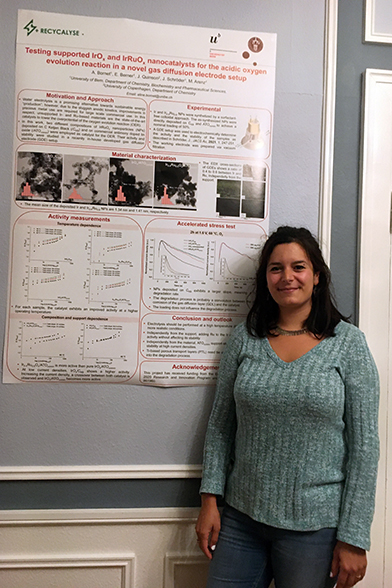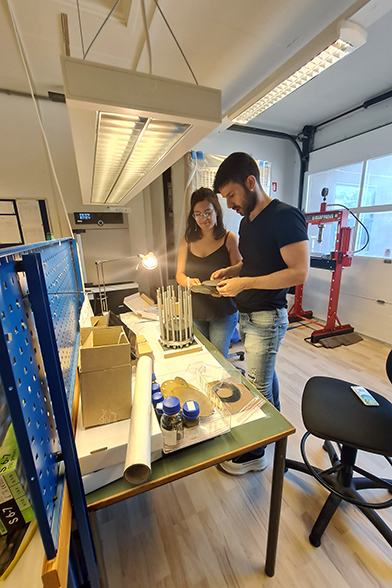Chemistry
«Networking is essential for young scientists»
Aline Bornet is writing her PhD thesis in chemistry as part of a project that aims to enable sustainable energy storage in the future. In the interview, she talks about how she found a one-month stay this summer at one of the partner institutions in Denmark scientifically and personally enriching.
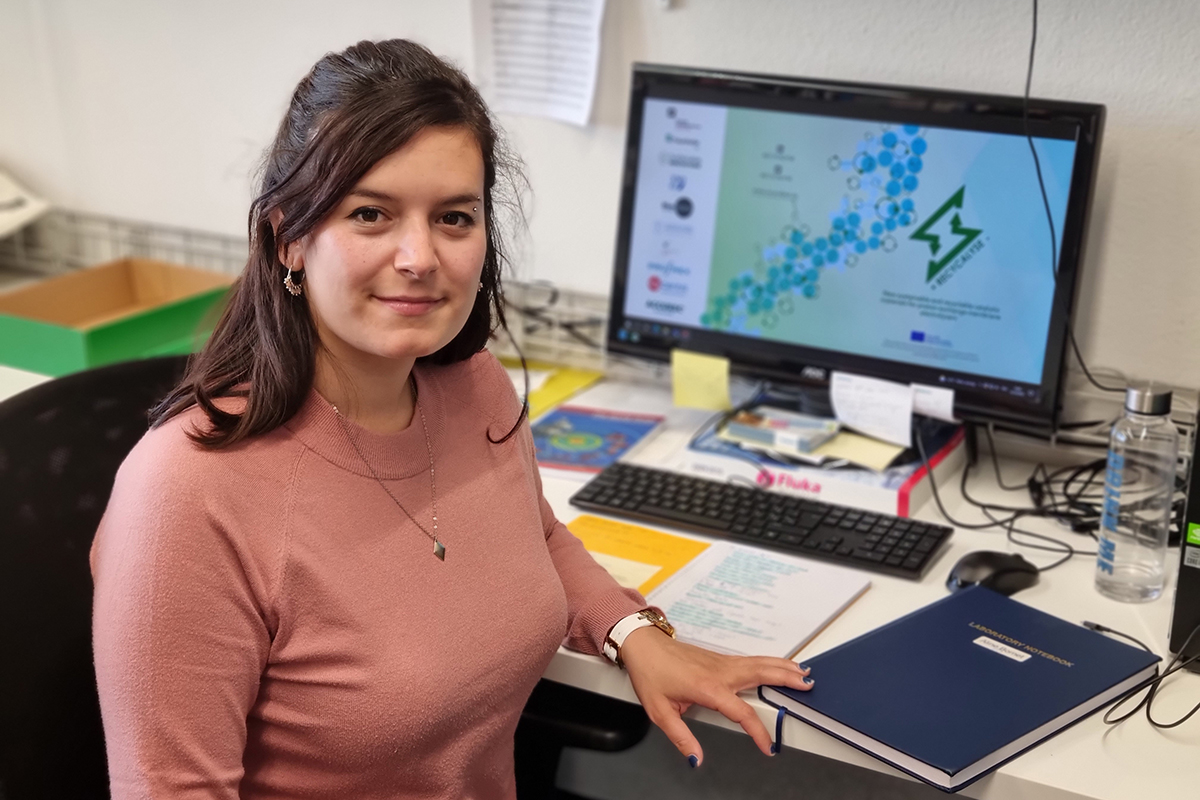
Aline Bornet: Basically, Recycalyse is about reducing our dependence on fossil fuels. Renewable energy sources such as solar power produce fluctuating energy output and energy storage is required. This is where the electrolysis of water into H2 and O2 comes into play. The H2 produced is a highly valuable molecule. It is widely used in chemical industry but can also serve as fuel for fuel cells. For efficient operation, the electrolyser needs an electrocatalyst that improves the electrochemical reaction, in which energy is stored. Recycalyse stands for “new sustainable and recyclable catalytic materials for proton exchange membrane electrolysers”. It focuses on two main objectives. The first is the development and manufacture of highly active sustainable catalysts containing reduced critical raw materials (CRM). The second is the establishment of a recycling and re-using scheme for proton exchange membrane electrolyser catalysts and other system parts.
Recycalyse consists of a consortium of European partners. How exactly is the University of Bern involved and how do you contribute to the project with your PhD?I am part of the NanoElectroCatalysis Group at DCBP, led by Prof. Matthias Arenz. Our group is the first link in the Recycalyse chain and therefore, we are mainly involved in its first main objective. First, we developed in a lab scale a catalyst with CRM like iridium and ruthenium. This catalyst was then upscaled at Danish Technological Institute – they are the coordinators of the Recycalyse project – and prepared to be tested in the first-generation so-called stack electrolyser. Now we are focusing on reducing the content of CRM in the catalyst. This is also the object of my PhD project: to synthesize and test new catalysts for this reaction. In addition, at University of Bern, we have developed a new electrochemical flow cell, which is used to test the performance of our catalysts under conditions closer to those of electrolysers.
You mentioned the Danish Technological Institute (DTI). You spent a month in Denmark this summer, right?Yes exactly. At the end of last year, I applied for an early-career researchers grant, offered by the Faculty of Science. My application was successful, and they supported me financially. I went to Copenhagen for the whole month of August. During this month, I mostly spent my time at DTI. But I also spent two days in a scientific retreat organized by the Center of High Entropy Alloy Catalysis (CHEAC) from the University of Copenhagen, and two more days at Blue World Technologies, another partner of Recycalyse.
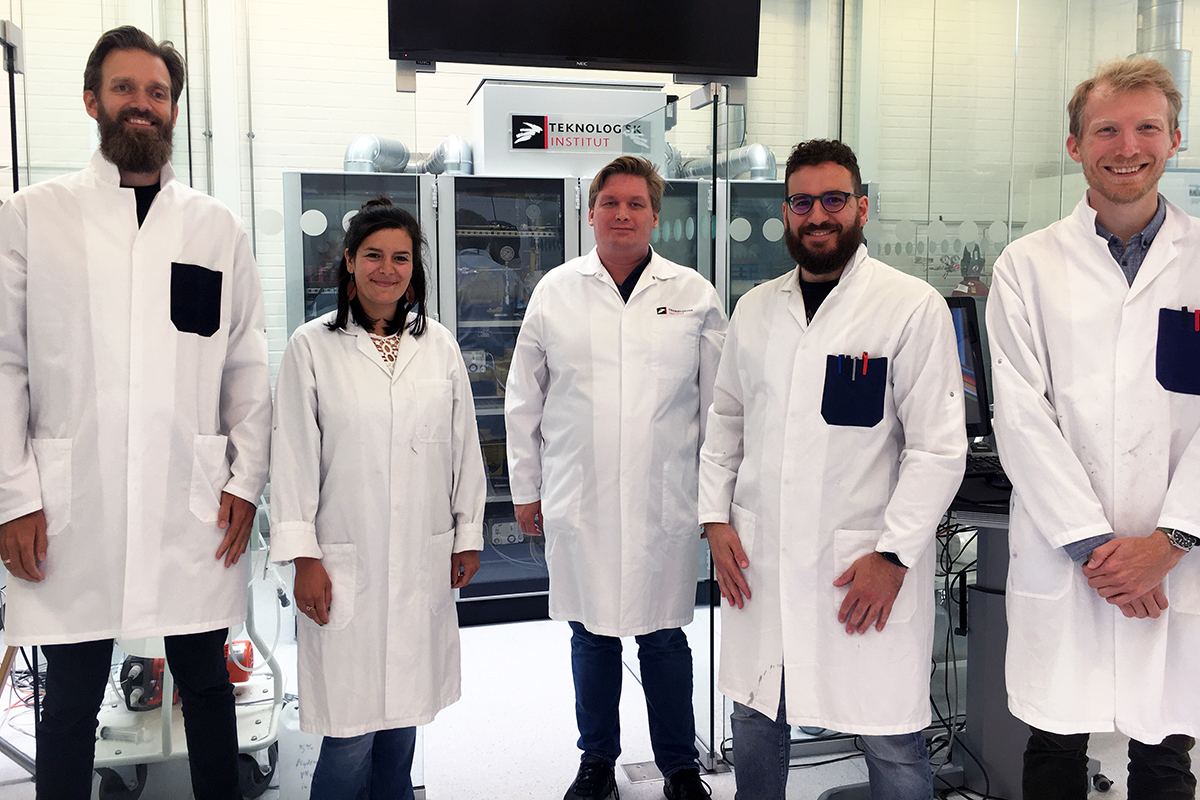
It was a win-win exchange. First, I explained them how to utilize the electrochemical flow cell developed in Bern. For this, I also had to show them how to prepare the needed electrodes. In exchange, I could perform under their supervision, 5 syntheses using their flow reactor. Those catalysts were tested in the electrochemical flow cell and in the more conventional rotating disk electrode (RDE) setup. As a parallel “project”, I tested my glassblower skills to repair reference electrodes.
And what about the scientific retreat and the visit at Blue World Technologies?During the scientific retreat organized by CHEAC, I finally had the chance to present my work in person in form of a poster. It was interesting to connect with other young scientists working in a similar field. Such events are important as they allow future collaborations and to develop new ideas. At Blue World Technologies, I had the opportunity to learn how to prepare electrodes using a spray method. The as-prepared electrodes were taken to Bern to be tested in a near future. Moreover, I helped assemble the first-generation stack electrolyser, which will be sent to Austria for testing. I really enjoyed seeing the hard work come to life!
The online magazine of the University of Bern
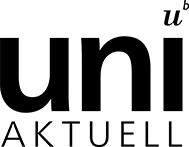
Subscribe to the uniAKTUELL newsletter
The University of Bern conducts cutting-edge research on topics that concern us as a society and shape our future. In uniAKTUELL we show selected examples and introduce you to the people behind them – gripping, multimedia and free of charge.
Since studying and working in chemistry, I have only experienced the lab scale, i.e. small amounts in the order of milligrams and small glassware. At DTI, everything was larger to be able to produce large quantity of materials. It was very interesting for me to learn to work with such quantities. Other aspects needed to be taken into consideration and everything was new to me. All these scientific aspects are important. But what seems more important to me during those short exchange stays are the exchange of ideas, the improvements of already well-known techniques, and the networking between partners rather than the results themselves. I really appreciated to finally get to know my Recycalyse partners in person. It was a friendly working atmosphere, which, I believe, is a very essential aspect of the whole experience.
Why do you think this kind of European exchange is especially important for early-career researchers like you?I think that the exchange of ideas, the possibility of collaboration, of discovering new devices and techniques, of thinking differently, and of course of networking are essential aspects for young scientists. Even if the sciences are well developed in Switzerland, it is always good to broaden your horizon because not all equipment and techniques are available in our country. I was sad to learn that new starting PhD candidates in Switzerland probably will have less chance of being part of a multifaceted project like mine due to the termination of negotiations with the EU for an institutional framework agreement.
Can you imagine continuing to pursue a scientific career after your PhD? What do you wish for your future?Definitely yes. I really enjoy working in a lab, and especially in this area of “green” chemistry. I have always been concerned about the environmental issues that we are facing today, and I would like to continue working in this field. I would really like to work with something related to recycling but if I stay in this green energy field, I will be happy too. However, I do not yet know if I will rather go towards an academic or an industrial career. A good alternative would be to work in an institute similar to DTI. It is too early for me to plan anything, and I like to stay open to new opportunities.
ABOUT RECYCALYSE
The idea behind RECYCALYSE is to disrupt the energy storage market through the development and manufacture of highly active sustainable oxygen evolution catalysts, and through a recycling scheme for proton exchange membrane electrolysers cells (PEMEC) catalysts, electrodes and overall system. This technology will help to reduce or eliminate critical raw materials, thus decreasing CO2 emissions and reducing costs.
RECYCALYSE is led by the Danish Technological Institute and formed by 9 more partners from 7 countries. For the University of Bern, the NanoElectroCatalysis Group of Prof. Matthias Arenz from the Department of Chemistry, Biochemistry and Pharmaceutical Sciences (DCBP) is part of the project. The project has received funding from the European Union’s Horizon 2020 research and innovation programme.
ABOUT ALINE BORNET
Aline Bornet has been a PhD candidate in the NanoElectroCatalysis Group at the Department of Chemistry, Biochemistry and Pharmaceutical Sciences (DCBP) of the University of Bern since 2020.
E-Mail: aline.bornet@unibe.ch
ABOUT THE AUTHOR
Ivo Schmucki is an editor and the "Nature and Matter" representative at the University of Bern Communication & Marketing Office.
